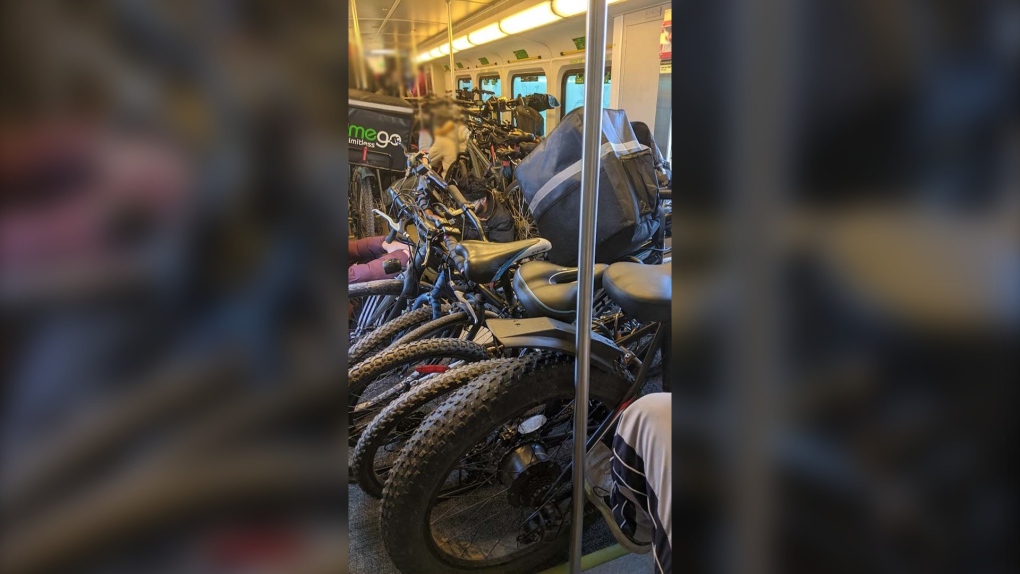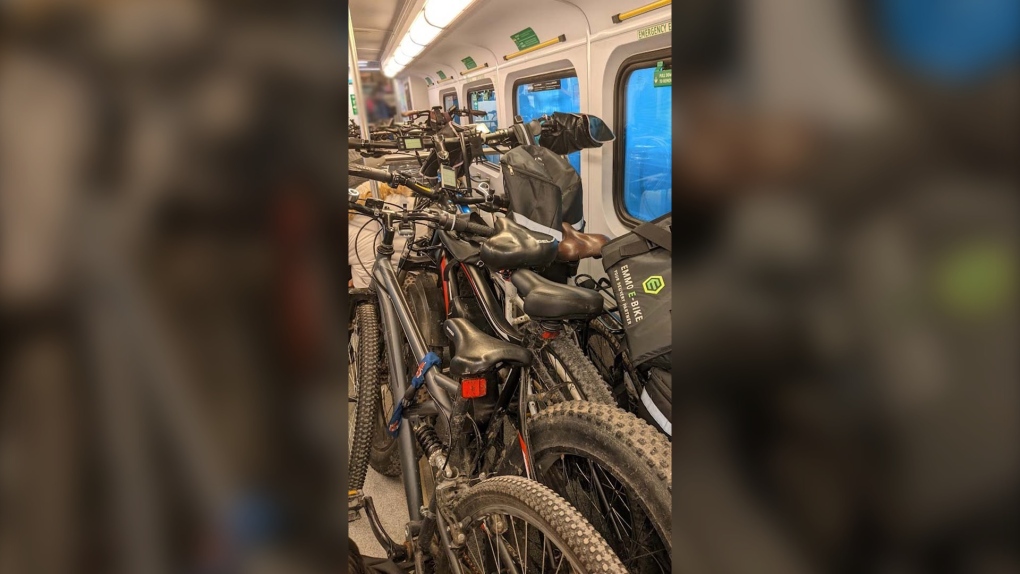'A huge, huge issue': Growing number of e-bikes on GO trains sparking safety concerns
An influx of e-bikes on GO trains has some GTA commuters concerned about whether the province’s transit agency is doing enough to keep riders safe.
Earlier this month, Janice Jim posted photos on social media of her commute into Toronto on GO Transit’s Kitchener line, showing a GO train bike carriage packed with e-bikes, leaving little space for the passengers on board to move around.
Many of the bikes appear to belong to individuals working for various food delivery services and are presumably using the train to get downtown, where business can be more brisk.
- Download our app to get local alerts on your device
- Get the latest local updates right to your inbox
“The safety concern is that, you know, you see how packed it is. There is no way to evacuate if something happens,” she told CP24.com on Friday.
“Some of the drivers were sitting in the middle of the pile of bikes and there really isn't a path through.”
In response to the increase in bikes and e-bikes on GO trains on the Kitchener line, Metrolinx began deploying dedicated bike cars on some scheduled trips.
In a statement to CP24.com, Metrolinx said it has taken “numerous steps” to respond to the situation, including adding scheduled trains to the line to accommodate additional passenger and bike capacity.
The transit agency noted that additional staff have been made available on platforms to “manage safety and disperse bikes evenly” across trains and said it is running an education campaign to provide more information to its cycling customers.
But Jim said the current measures do not appear to go far enough to address the problem and added that she fears an e-bike fire similar to the recent one on the TTC could happen on a GO train.
On Jan. 2, an e-bike caught fire on a subway car stopped at Sheppard-Yonge Station in North York. Passengers were able to quickly evacuate the car and Toronto Fire crews were able to contain and eventually extinguish the blaze. The owner of the e-bike sustained non-life-threatening injuries.
- READ MORE: E-bike fire on TTC subway was 'rapid and intense,' Toronto Fire says. Here's how it erupted
Toronto Fire Chief Matthew Pegg said at the time that the fire was the result of a faulty lithium ion battery pack.
The Toronto Fire Service previously said that there were 55 lithium ion battery fires in 2023, nearly double the number recorded one year prior. Pegg described the issue as one of “growing concern,” adding that the majority of these fires involve “micro-mobility devices,” such as scooters and e-bikes.
Jim called the situation on GO Transit “a disaster waiting to happen.”
“It's a huge, huge issue,” she said.
Metrolinx said it is in "close contact" with the TTC and Toronto Fire Services since the e-bike fire on the subway.
"This includes conducting site investigations in cooperation with Toronto Fire Services to better understand the risk of a similar event on GO Transit services, as well as potential mitigations," the transit agency said.
"All GO trains are constructed with flame retardant materials as per the National Fire Protection Association standards."
Metrolinx continued that to "further enhance the safety of customers, staff and the public," GO Transit is reviewing its bike and e-bike policies "as it relates to emergency procedures."
Jim said in order to accommodate bikes and e-bikes on trains and space them out adequately, Metrolinx must boost service and add more bike carriages to scheduled trains.
Jim said while some who saw her social media post were well aware of the ongoing issue, others were not.
“This problem has been going on for at least a year. Most commuters are aware and just deal with it,” she said.
 Several e-bikes are seen on a bike car on a GO train along the Kitchener line on Feb. 2, 2024. (Submitted/ Janice Jim)
Several e-bikes are seen on a bike car on a GO train along the Kitchener line on Feb. 2, 2024. (Submitted/ Janice Jim)
She said many of the e-bike operators she has spoken to on transit are international students who are trying to make a little money delivering food downtown.
“They can't find any other jobs,” she said. “Some days they make like $20 for the whole day and they're out for like, you know, 10 hours… So this is a bad situation for them.”
Jim said some who live downtown and order food from delivery apps are unaware of the distance the delivery drivers have to commute in order to work.
Alison Stewart, of Cycle TO, said that GO trains will continue to need more space for bikes and e-bikes as the city becomes a “less and less affordable” place for people to live.
“People need to come into the city for work,” she said.
“The one thing that's a bit unfortunate about this is that the food delivery carriers are being the main focus of this, but it's also other workers as well.”
She said Metrolinx needs to do more to encourage people to use transportation options that don’t include cars.
“They should absolutely encourage and make it easier for people to make multi-modal trips with GO and they have the ability to do so,” she said.
She said Metrolinx needs to boost the number of bike cars and include them on all scheduled trains on the Kitchener line, including during the rush-hour commute. Bikes are not currently allowed on GO trains during the morning and afternoon rush hour.
Both Stewart and Jim also said they don’t believe Metrolinx is clearly communicating when the bike cars will be offered on trains, adding to the confusion for riders who need to bring their bikes with them to the city.
Stewart said Metrolinx should consider expanding safe and secure parking facilities at GO stations to reduce the number of bikes on board trains.
“For the myriad of people who are students and workers who rely on their e-bikes, it will also free up space for them (on trains),” she noted.
“If people are ordering food from the delivery apps, then they should be supportive and want to find a solution to make their work safer and more convenient.”
 Several e-bikes are seen on a bike car on a GO train along the Kitchener line on Feb. 2, 2024. (Submitted/ Janice Jim)
Several e-bikes are seen on a bike car on a GO train along the Kitchener line on Feb. 2, 2024. (Submitted/ Janice Jim)
Some advocates have urged the companies that hire drivers for food delivery, such as UberEats, to step up to help improve the situation for couriers.
In a statement to CP24.com, a spokesperson for Uber, said the company continuously looks for “ways to improve” and would be “happy to sit down with stakeholder partners like Metrolinx.”
“Uber has been working to level up the standard of app-based work, advocating for benefits and protections including a minimum earnings standard of 120 per cent minimum wage for engaged time, a benefits fund that would give funding to spend on chosen benefits, and occupational accident coverage that covers injuries sustained during engaged time,” the statement read.
“If GO is seeing more of their paying customers bringing bicycles onto their trains, they might wish to change their policies, increase their train services or offer other alternatives to better serve commuters.”
CTVNews.ca Top Stories

Trump threatens to try to take back the Panama Canal. Panama's president balks at the suggestion
Donald Trump suggested Sunday that his new administration could try to regain control of the Panama Canal that the United States “foolishly” ceded to its Central American ally, contending that shippers are charged “ridiculous” fees to pass through the vital transportation channel linking the Atlantic and Pacific Oceans.
Man handed 5th distracted driving charge for using cell phone on Hwy. 417 in Ottawa
An Ottawa driver was charged for using a cell phone behind the wheel on Sunday, the fifth time he has faced distracted driving charges.
Wrongfully convicted N.B. man has mixed feelings since exoneration
Robert Mailman, 76, was exonerated on Jan. 4 of a 1983 murder for which he and his friend Walter Gillespie served lengthy prison terms.
Can the Governor General do what Pierre Poilievre is asking? This expert says no
A historically difficult week for Prime Minister Justin Trudeau and his Liberal government ended with a renewed push from Conservative Leader Pierre Poilievre to topple this government – this time in the form a letter to the Governor General.
opinion Christmas movies for people who don't like Christmas movies
The holidays can bring up a whole gamut of emotions, not just love and goodwill. So CTV film critic Richard Crouse offers up a list of Christmas movies for people who might not enjoy traditional Christmas movies.
More than 7,000 Jeep SUVs recalled in Canada over camera display concern
A software issue potentially affecting the rearview camera display in select Jeep Wagoneer and Grand Cherokee models has prompted a recall of more than 7,000 vehicles.
'I'm still thinking pinch me': lost puppy reunited with family after five years
After almost five years of searching and never giving up hope, the Tuffin family received the best Christmas gift they could have hoped for: being reunited with their long-lost puppy.
10 hospitalized after carbon monoxide poisoning in Ottawa's east end
The Ottawa Police Service says ten people were taken to hospital, with one of them in life-threatening condition, after being exposed to carbon monoxide in the neighbourhood of Vanier on Sunday morning.
New York City police apprehend suspect in the death of a woman found on fire in a subway car
New York City police announced Sunday they have in custody a “person of interest” in the early morning death of a woman who they believe may have fallen asleep on a stationary subway train before being intentionally lit on fire by a man she didn't know.


































